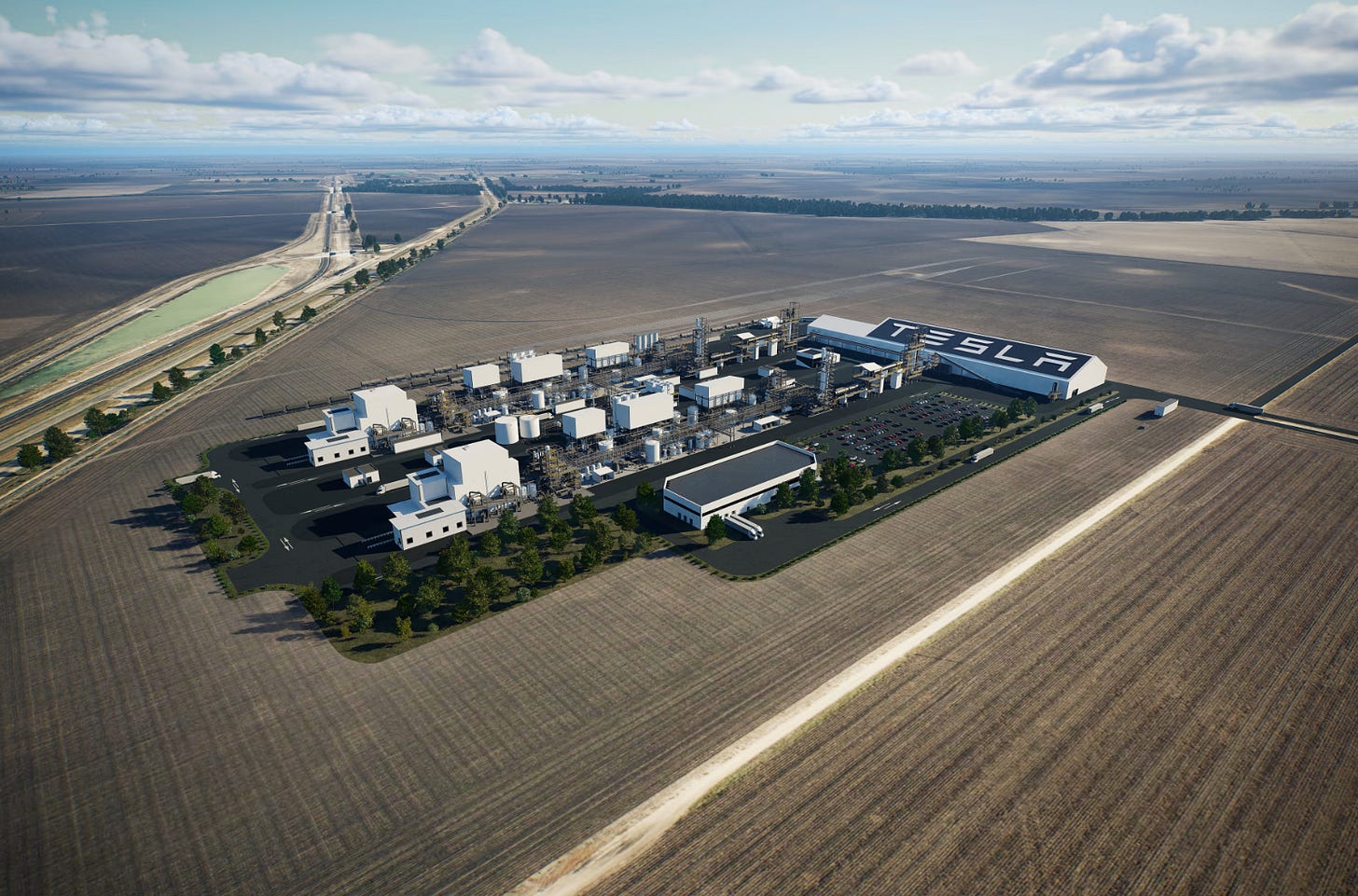TL;DR
Tesla broke ground on its Texas lithium refinery on May 8, 2023.
Tesla controls more of its supply chain, from lithium mining to refining and battery production.
Uses an acid-free process, producing less hazardous byproducts and promoting sustainability.
Reduces dependency on suppliers, improves quality control, cuts costs, and increases resilience against supply chain issues.
Could set a new industry standard for environmental practices and encourage similar moves in the EV sector.
As of today, November 17, 2024, the Tesla lithium refinery in Texas shows significant progress in its construction:
Structural Progress: Most of the Pyrometallurgical & Hydrometallurgical sections of the first half of the plant have been assembled. There's also ongoing work on the final packaging areas.
Site Development: New grading areas have been spotted on the north side of the facility, indicating that preparation for further construction or expansion is underway.
Infrastructure: The rail spur for Spodumene Concentrate-6 beta is still under construction, which is crucial for transporting the raw lithium materials.
This information reflects the ongoing development and the nearing completion of various sections of the refinery, aiming towards operational readiness for producing battery-grade lithium hydroxide.
On May 8, 2023, Tesla took a monumental step towards vertical integration in the electric vehicle (EV) industry by breaking ground on its Texas lithium refinery. This initiative isn't just an expansion of its production capabilities but a strategic move to control more of its supply chain, from raw materials like lithium straight through to the final product, the electric vehicle.
Located near Corpus Christi, Texas, this facility marks Tesla's first foray into lithium refining in North America. The purpose of this refinery is to transform raw lithium into battery-grade lithium hydroxide, a crucial component in lithium-ion batteries that power Tesla's vehicles. What sets this project apart is Tesla's innovative approach to lithium processing. Unlike traditional methods that rely on harsh chemicals like sulfuric acid, Tesla plans to use an acid-free method. This not only aims to be environmentally friendlier but also produces byproducts like sand and limestone, useful in construction, thereby enhancing the sustainability of the operation.
This shift towards an acid-free refining process is a significant innovation compared to other refineries in the USA:
Conventional lithium refining often involves chemicals that can harm the environment. Tesla's method, by avoiding these, reduces the ecological footprint significantly.
Instead of producing waste, Tesla's process generates byproducts that have practical applications, minimizing waste and potentially providing an additional revenue stream or at least reducing disposal costs.
Tesla claims that its refining process consumes 20% less energy than traditional methods, which could further reduce the environmental impact and operational costs.
This move matters significantly for Tesla for several reasons. Firstly, it gives Tesla greater control over the supply of lithium, reducing dependency on external suppliers. This control allows Tesla to ensure the quality of the lithium used in its batteries, potentially leading to better battery life and performance in their vehicles. Moreover, in-house production could lead to cost efficiencies, minimizing transport costs and logistical complexities since the lithium can be processed closer to where it's used in battery production. Tesla's gigafactory in Nevada, where batteries are made, benefits directly from this proximity.
The broader implications of Tesla's move are substantial. By innovating in the refining process, Tesla might set a new standard for less harmful lithium production, potentially influencing the entire industry's environmental practices. If successful, this could encourage other manufacturers to follow suit, possibly leading to a broader trend towards vertical integration in the EV sector. Additionally, by localizing the supply of a key battery component, Tesla reduces reliance on foreign lithium sources, which could be a strategic move in light of global supply chain vulnerabilities and geopolitical strategies.
Tesla's lithium refinery project is not just another factory; it's a strategic play in the global electric vehicle production game. This groundbreaking initiative towards vertical integration showcases how Tesla aims not only to innovate in electric vehicles but also in how they're made, from the ground up. This could very well be the blueprint for future automotive giants weaving their way into the electrified road ahead, redefining the approach to energy and manufacturing in the automotive sector.





Sounds good - I didn't know about this - thanks. But there is still the problem of the environmental damage and supply chain and emissions from mining the raw lithium, right? Also, will this help in regard to the recycling of the lithium batteries at end of useful life, or will that still be a very expensive task?
Way cool - I think Tesla will be a survivor in the EV space because of Elon.